Small diesel generators have already become essential tools for various applications when discussing power solutions that are reliable and efficient. They prove their worth by delivering the best performance and enduring hardships in any situation. This blog post is going to tell you everything about small diesel generators—their working process, advantages, and reasons for their uniqueness compared to other power solutions. Keep reading to know how these machines can easily and reliably satisfy your power needs.
Benefits of Using Small Diesel Generators
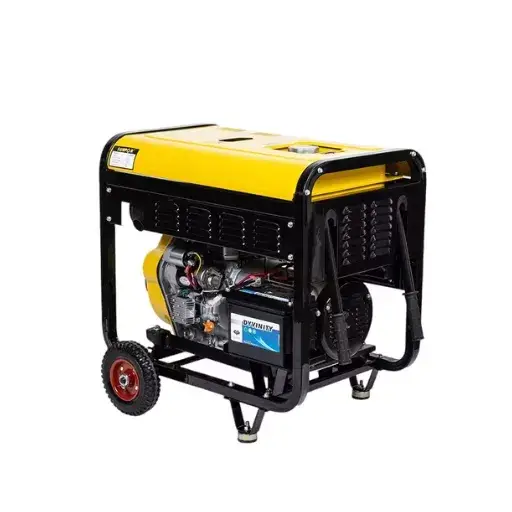
- Fuel Efficiency: The diesel generators are known for being very fuel-efficient. They use less fuel than other types of generators, making them the best choice for long-term use, even financially.
- Durability and Longevity: Small diesel generators are very durable and built to withstand harsh conditions. With proper maintenance, they can last for quite a long time.
- Reliable Performance: The diesel engines are usually designed for high performance, and they provide a quiet and reliable power output even in challenging situations.
- Low Maintenance Requirements: Diesel generators need less frequent maintenance compared to gasoline engines because of the strength of their components.
- Versatility: The generators are versatile and can be used in various ways, from construction sites to providing backup power for homes and businesses.
Why Diesel Generators Stand Out
The diesel generators have become the most striking option in the market, thanks to their unparalleled efficiency, reliability, and durability. Based on recent data, diesel engines have a fuel consumption rate up to 30% less than gasoline engines, making them an economical choice for both commercial and residential areas. Their ability to bear heavy loads and work long hours without failure makes them reliable, even in extreme cases such as power cuts or industrial applications. As technology progresses, modern diesel generators are quieter and less polluting than older ones, significantly reducing noise and emissions. The combination of performance, cost-effectiveness, and adaptability makes diesel generators the most outstanding choice in the market.
Advantages of Small Diesel Generators
Portable diesel generators offer many benefits, making them a common choice for both private and business purposes. Being small, these generators can easily be moved and installed, which is why they are ideal for camping, building sites, small companies, or home power backup. Diesel engines are very efficient and consume less fuel per hour compared to gasoline, making them the most cost-effective in the long run. Moreover, these engines are made sturdy for use in harsh conditions for many years. Because fewer parts can wear out, the maintenance of small diesel generators is lower, making them more economical and a reliable power source. They can also provide uniform power and meet modern emission standards.
Key Features to Consider When Purchasing a Small Diesel Generator
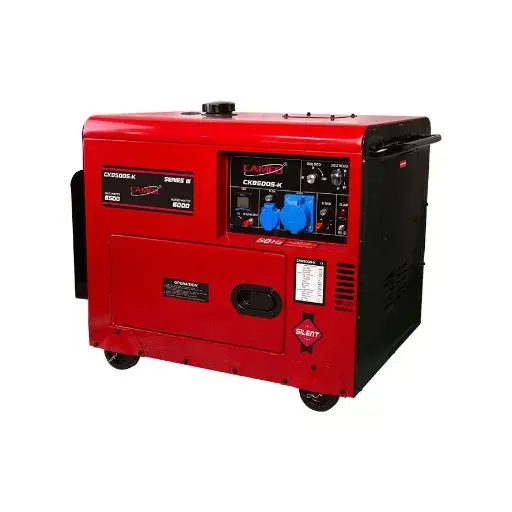
Power output, fuel consumption, and sound levels are key aspects to consider when buying a small diesel generator. First, ensure the generator’s wattage matches your energy requirements to avoid overloading or underutilization. Next, try to find the model with the highest fuel efficiency rating to minimize your operating expenses and reduce pollution caused by the generator. Sound levels can also be a determining factor, and a generator with sound-dampening features might be a good investment in case you’re in a noise-sensitive area or simply want to work in peace. Furthermore, it is wise to choose models that are durably built and easy to maintain, as these traits will undoubtedly contribute to the machine’s long-lasting reliability and cost-effectiveness.
Power Output and Capacity
It is essential to have a clear understanding of your energy needs when you evaluate the power output and capacity of a generator. Start by calculating the wattage of all the devices and appliances you will be powering, and also consider the starting and running wattage of each. Generators are usually offered in a variety of sizes, from portable generators that give out a few hundred watts to massive industrial generators that supply tens of thousands of watts. A slightly bigger generator than you need will provide flexibility, ensuring it covers future needs without being overburdened.
Portability and Build Quality
When evaluating portability and build quality, it is essential to consider the generator’s size, weight, and the materials used in its construction. For portable generators, features such as solid wheels, comfortable handles, and space-saving designs make them easier to move and store. The latest surveys show that people commonly look for light models with long-lasting frames that can resist outdoor conditions; thus, they prefer materials that resist corrosion and are strong in construction. Ensuring the generator is made from top-notch materials not only prolongs its life but also guarantees reliability during long-term use in various locations. A generator that matches your requirements is primarily one that offers a balance between portability and durability.
Comparison with Other Types of Generators
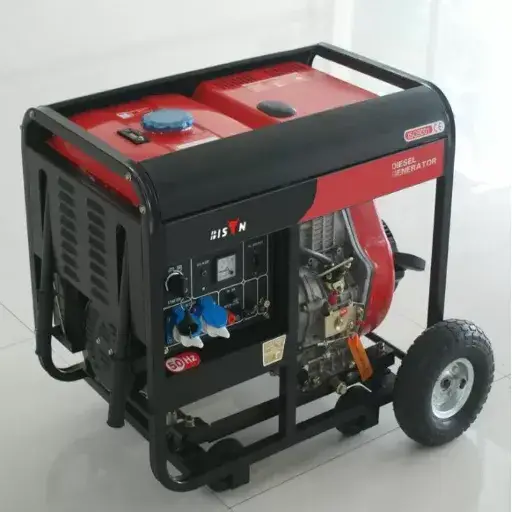
Key differences come out when generators are classified as portable, stationary, or inverter. As the name indicates, portable generators are the least powerful and the first choice for temporary power supply, like those in camps or during emergency outages. Stationary generators, on the other hand, are expensive but more powerful, as they run for up to weeks at a time for whole houses or larger installations. Inverter generators are generally the most costly to operate due to their high wattage, although they are generally the least noisy and least fuel-consuming of all types. All these generators produce different electrical currents, and the choice depends on personal preferences such as power output, the buyer’s budget, and the purpose of the device.
Diesel vs. Petrol Generators
Here’s a concise comparison table for Diesel vs. Petrol Generators based on the latest information and trends:
| Key Point | Diesel Generators | Petrol Generators |
|---|---|---|
| Fuel Efficiency | More fuel-efficient, lower consumption | Higher fuel consumption |
| Durability | Longer lifespan, robust engines | Shorter lifespan, less durable |
| Maintenance | Lower maintenance needs | Higher maintenance needs |
| Cost | Higher upfront cost | Lower upfront cost |
| Fuel Cost | Diesel is cheaper long-term | Petrol is more expensive long term |
| Performance | Better for heavy-duty, extended use | Suitable for light, short-term use |
| Noise Levels | Quieter with modern noise reduction | Louder operation |
| Environmental Impact | Lower emissions with advanced models | Higher emissions |
| Fuel Storage | Safer and more stable | Flammable and less stable |
| Cold Weather Performance | Performs well in cold conditions | Struggles in cold conditions |
| Applications | Industrial, commercial, emergency use | Residential, recreational, light use |
| Portability | Heavier, less portable | Lighter, more portable |
| Startup Time | Slower startup | Faster startup |
| Market Trends | Hybrid, eco-friendly innovations | Limited technological advancements |
Diesel vs. Natural Gas Generators
Here’s a concise comparison table for Diesel vs. Natural Gas Generators based on the latest information and trends:
| Key Point | Diesel Generators | Natural Gas Generators |
|---|---|---|
| Fuel Availability | Widely available globally | Requires pipeline or storage tanks |
| Fuel Cost | Moderate, stable pricing | Cheaper, but the price fluctuates regionally |
| Fuel Storage | Easier to store, safer | Requires large tanks, more complex |
| Efficiency | High fuel efficiency | Slightly less efficient |
| Durability | Robust, long-lasting engines | Less durable, shorter lifespan |
| Maintenance | Lower maintenance needs | Higher maintenance due to gas systems |
| Environmental Impact | Higher emissions, improving with tech | Cleaner, lower emissions |
| Performance | Reliable for heavy-duty use | Best for continuous, light-to-moderate use |
| Startup Time | Slower startup | Faster startup |
| Applications | Industrial, emergency, off-grid use | Residential, commercial, grid-tied use |
| Cold Weather Performance | Performs well in cold conditions | May struggle in extreme cold |
| Noise Levels | Quieter with modern tech | Generally quieter |
| Initial Cost | Higher upfront cost | Lower upfront cost |
| Market Trends | Hybrid, eco-friendly innovations | Growth in renewable gas integration |
Potential Use for Small Diesel Generators
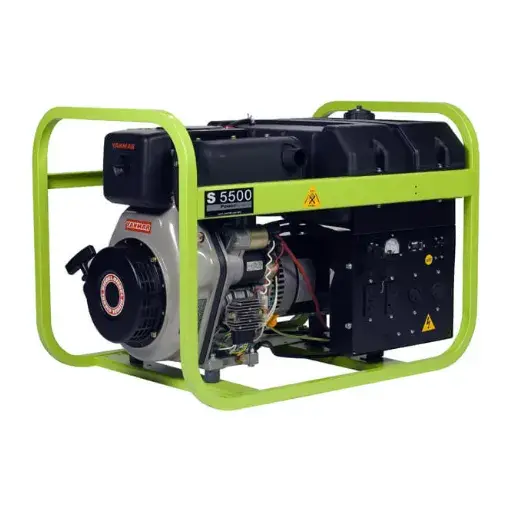
Small diesel generators are highly adaptable and can be used in various situations. They are perfect for industrial and emergencies where dependable power is significant. Their heavier performance in colder temperatures and reduced power consumption during extended usage are two strong points that make them the best choice for remote sites, construction, and essential service power backup. In addition to that, they are generally used in areas of the country where electricity is unstable. In situations like natural calamities or blackouts, they are the first choice because they provide power.
Residential Applications
There is a growing trend of using diesel generators for residential purposes, especially in areas where power outages or unreliable electricity grids are common. These generators are used by homeowners as a backup power source so that the essential appliances like refrigerators, heating systems, and medical equipment can continue to function without interruption. The technological advancements have resulted in the development of modern diesel generators, which are quieter, more fuel-efficient, and environmentally friendly, making them suitable for home use. Besides, their long lifespan and low maintenance make them a good investment for families who need a reliable energy source in case of emergencies.
Recreational and Event Use
Diesel generators are still commonly found in the field of recreation and events, as they are very reliable power sources for outdoor parties, concerts, camping, and festivals. Their ability to provide constant power makes it possible for the lighting, sound systems, and other equipment to work together seamlessly, even in hard-to-reach places. The manufacturers have made modern diesel generators lightweight and user-friendly, making them the best choice for both event planners and outdoor lovers. Besides, their power-saving and strong features ensure they will be there with you whenever you need them, providing a continuous power source for activities that require a lot of power.
Maintenance Tips for Small Diesel Generators
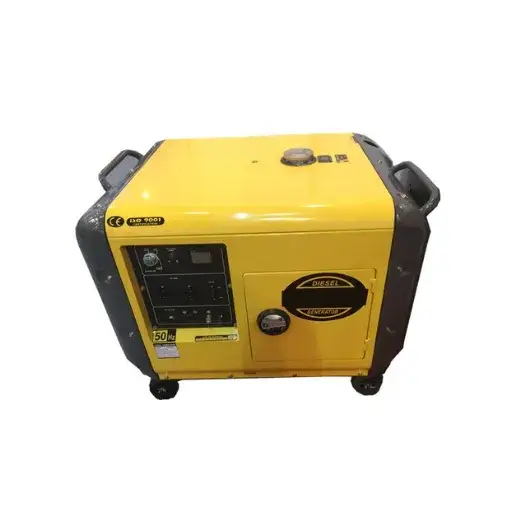
Regular Oil Changes
To keep the engine running smoothly and to avoid damage, check and change the oil according to the manufacturer’s suggestions.
Inspect the Air Filter
Change the air filter regularly or clean it to ensure the right amount of air is circulating and to prevent dirt from accumulating, which could harm the engine.
Monitor Coolant Levels
Ensure the coolant levels are always within the recommended limits to prevent the engine from overheating and to maintain optimal performance.
Check the Fuel System
Eliminate any possibility of interruptions by using clean, high-quality fuel and regularly checking fuel lines for leaks or blockages.
Routine Maintenance Practices
Routine maintenance frequency is influenced by various factors, such as equipment type, the manufacturer’s suggestions, and the operating environment. In general, primary parts such as oil and filters have to be replaced or examined every few months or after 3,000-5,000 miles for cars. For other machines, inspection intervals can be set from once a week to once a month, depending on how often they are used. The manuals should always be referred to for the equipment guidelines, as compliance with the suggested intervals will guarantee the equipment’s longer life and better functioning.
Prolonging Generator Lifespan
I make sure to carry out regular maintenance, which consists of timely oil changes, filter replacements, and checking the parts for wear and tear, among other things, to extend the lifespan of a generator. I follow the manufacturer’s instructions and do not overload the generator to avoid putting extra stress on its parts. Proper storage and testing at intervals enable the generator to remain in good working condition for a long time.
Reference Sources
Below are five expert and credible references concerning small diesel generators that could help you confirm the accuracy of your article:
- University of Michigan – Environment, Health & Safety
The information from this source indicates the necessary precautions for spill prevention as well as the correct installation of diesel fuel generators. - North Dakota State University – Agriculture
This webpage covers all aspects of generator operation, including the diesel models, and provides information about their safety measures. - Harvard ADS (Astrophysics Data System)
The research paper aims to model the dynamics of small diesel generators for microgrid stability. - Oregon State University – Biochemistry Blog
The article provides a detailed comparison of diesel and gas generators, highlighting the advantages of diesel models. - U.S. Department of Energy
The paper provides some insights into the process of portable diesel generator installation in particular places.
Frequently Asked Questions (FAQs)
What are small diesel generators?
Small diesel generators are compact, efficient power sources that utilize diesel fuel to generate electricity. They are commonly used for backup power, portable applications, and in commercial settings where reliable electricity is essential. Diesel generators are known for their durability and fuel efficiency, making them a popular choice for both residential and industrial needs.
How do small diesel generators compare to gasoline generators?
Small diesel generators generally offer better fuel efficiency and longer run times compared to gasoline generators. Diesel engines typically have a longer service life, lower maintenance costs, and higher torque, making them suitable for heavy-duty applications. Additionally, diesel fuel is often more economical, especially in areas where gasoline prices are high.
What is the power output of small diesel generators?
The power output of small diesel generators can vary widely, typically ranging from 1 kW to 10 kW. This output is sufficient for various applications, including powering small appliances, tools, and even RVs. For larger needs, commercial mobile options can provide more power, often exceeding 20 kW.
What are the advantages of using a portable diesel generator?
Portable diesel generators offer several advantages, including convenience, portability, and the ability to provide power in remote locations. They are often lightweight and compact, making them easy to transport for outdoor events, camping, or emergency preparedness. Furthermore, their durability ensures they can withstand various environmental conditions.
What brands are popular for small diesel generators?
Some popular brands for small diesel generators include Cummins, Onan, Yanmar, Kubota, and Mitsubishi. Each of these manufacturers offers a range of models tailored to different power needs and applications. For instance, the Cummins Onan QD series is well-regarded for its reliability and performance in RVs and mobile applications.
How much fuel do small diesel generators consume?
The fuel consumption of small diesel generators varies based on the generator’s size and load. On average, a small diesel generator may consume between 0.5 and 1 gallon of diesel per hour at full load. This fuel efficiency makes them a practical option for extended use, especially in remote locations or during emergencies.
What maintenance is required for small diesel generators?
Regular maintenance is crucial for ensuring the longevity and reliability of small diesel generators. This includes routine checks of oil levels, coolant systems, and fuel filters. It’s also essential to monitor RPM levels and perform tasks such as changing the oil and filters based on the manufacturer’s recommendations to maintain optimal performance.
Can small diesel generators be used for solar power systems?
Yes, small diesel generators can complement solar power systems, especially during periods of high demand or low solar production. They provide a reliable backup power source, ensuring that essential appliances remain operational. This combination enhances energy efficiency and offers a versatile power solution for off-grid living or emergencies.
What safety precautions should be taken when using a small diesel generator?
When using a small diesel generator, it’s essential to follow safety guidelines to prevent accidents. Continuously operate the generator outdoors to avoid carbon monoxide buildup, use heavy-duty extension cords rated for the load, and ensure proper grounding. Regular inspection of the fuel system and electrical components is also essential for safe operation.
